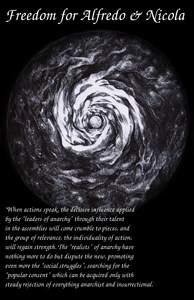On Sexual Poverty

A society based upon concentrated power and economic exchange impoverishes every area of life, even those that are most intimate. We hear a great deal of talk about women’s liberation, gay liberation and even sexual liberation within anarchist circles. And analyses of male domination, patriarchy and hetero-sexism are not so hard to find, but the reality of sexual impoverishment seems to be largely ignored, questions of sexual expression being largely limited to those surrounding monogamy, non-monogamy, poly-amory and other such issues of the mechanics of loving relationships. This limitation is itself, in my opinion, a reflection of our sexual impoverishment — let’s limit ourselves to speaking of such relational mechanics so that we can avoid the question of the quality of these relationships.
There are several factors that play into the sexual impoverishment we experience in this society. If we look into its origins, of course, the institutions of marriage and the family and the imposition of patriarchal social structures are significant, and their role cannot be ignored. But in the present at least here in the so-called West, the strength of these institutions has greatly diminished over the past several decades. Yet sexual impoverishment has not. If anything, it has become more intense and desperately felt.
The same process that has led to the weakening and gradual disintegration of the family is what now upholds sexual impoverishment: the process of commodification. The commodification of sexuality is, of course, as old as prostitution (and so nearly as old as civilization), but in the past five decades, advertising and the media have commodified the conception of sexuality. Advertisements offer us charismatic sexiness, bound to lead to spontaneous passion in deodorant sticks, toothpaste dispensers, perfume bottles and cars. Movies and TV shows sell us images of the ease with which one can get beautiful people into one’s bed. Of course, if one is gorgeous and charismatic oneself — and so the deodorants, perfumes, gyms, diets and hair gels sell. We are taught to desire plastic images of “beauty” that are unattainable because they are largely fictitious. This creation of unattainable, artificial desires serves the needs of capital perfectly, because it guarantees an ongoing subconscious dissatisfaction that can be played on to keep people buying in the desperate attempt to ease their longing.
The commodification of sexuality has led to a kind of “liberation” within the schema of market relationships. Not only does one frequently see sexual relations between unmarried people on the big screen, but increasingly homosexuality, bisexuality and even a bit of kinkiness are achieving some level of acceptability in society. Of course, in a way that suits the needs of the market. In fact, these practices are transformed into identities to which one more or less strictly conforms. Thus, they come to require much more than the practice of a particular sexual act. An entire “lifestyle” comes to be associated with them, involving conformity, predictability, specific places to go, specific products to buy. In this way, gay, lesbian, bi, leather, s/m and b/d subcultures develop which function as target markets outside of traditional family and generational contexts.
In fact, the commodification of sexuality places all forms of sexual practice in a context of products for sale at a price. In the sexual marketplace, everyone is trying to sell himself to the highest bidder while trying to purchase those who attract her at the lowest price. Thus, the association of sexuality with conquest, competition, struggles for power. Thus, the absurd games of playing hard to get or of trying to pressure the other into having sex. And thus, the possessiveness that so often develops in ongoing “love” relationships — after all, in the market regime, doesn’t one own what one has purchased?
In this context, the sexual act itself tends to take on a more measured, quantifiable form in keeping with this commodification. Within a capitalist society it should be no surprise that the “liberation” of sexual frankness would predominantly mean an increasing discussion of the mechanics of sex. The joy of the sexual act is reduced not just to physical pleasure, but more specifically to the orgasm, and sexual discourse centers around the mechanics for most effectively achieving orgasm. I do not want to be misunderstood. An ecstatic orgasm is a marvelous thing. But centering a sexual encounter around achieving an orgasm leads one to lose touch with the joy of being lost in the other here and now. Rather than being an immersion into each other, sex centered around achieving orgasm becomes a task aimed at a future goal, a manipulation of certain mechanisms to achieve an end. As I see it, this transforms all sex into basically masturbatory activity — two people using each other to achieve a desired end, exchanging (in the most economic sense) pleasure without giving anything of oneself. In such calculated interactions, there is no place for spontaneity, passion beyond measure, or abandoning oneself in the other.
This is the social context of sexuality in which we currently live. Within this context there are several other factors that further reinforce the impoverishment of sexuality. Capitalism needs partial liberation movements of all sorts both to recuperate revolt and to spread the stultifying rule of the market into more and more aspects of life. Thus, capitalism needs feminism, racial and national liberation movements, gay liberation and, yes, sexual liberation. But capitalism never immediately sheds the old ways of domination and exploitation, and not just because it is a slow and cumbersome system. Partial liberation struggles retain their recuperative use precisely by continuing to have the old oppressions as a counterpart to prevent those involved in the liberation struggles from seeing the poverty of their “liberation” within the present social order. Thus, if puritanism and sexual oppression were truly eradicated within capitalism, the poverty of the supposedly more feminist conscious, gay-friendly sex shops would be obvious.
And so puritanism continues and not just as an out-dated holdover from earlier times. This is manifested in the obvious ways, such as the continued pressure to get married (or at least establish an identity as a couple) and have a family. But it also manifests in ways most people would not notice, because they have never considered other possibilities. Adolescence is the time when sexual urges are strongest due to the changes in the body that are taking place. In a healthy society, it seems to me that adolescents would have every opportunity to explore their desires without fear or censure, but rather with openness and advice, if they want it, from adults. While the intense sexual desires of adolescents are clearly recognized (how much TV and movie humor is based on the intensity of this desire and the near impossibility of exploring it in a free and open way?) in this society, rather than creating means for these desires to be explored freely, this society censures them, calling for abstinence, leaving adolescents to either ignore their desires, limit themselves to masturbating or accept often hurried sex in high pressure situations and uncomfortable environments in order to avoid detection. It’s hard not to wonder how any sort of healthy sexuality could develop from this.
Because the only sort of sexual “liberation” of use to capitalism is one that continues to rest in sexual scarcity, every tool for maintaining sexual repression in the midst of the fictitious liberation is used. Since the old religious justifications for sexual repression no longer hold much water for large portions of the populace, a material fear of sex now acts as a catalyst for a repressive sexual environment. This fear is promoted mainly on two fronts. First of all there is the fear of the sexual predator. Child molestation, sexual stalking and rape are very real occurrences. But the media exaggerates the reality with lurid accounts and speculation. The handling of these matters by the authorities and the media are clearly not aimed at dealing with the very real problems, but at promoting a specific fear. In reality, the instances of non-sexual violence against children and women (and I am specifically referring to those acts of violence based on the fact that the victims are children or women) are many times more frequent than acts of sexual violence. But sex has been invested with a strong social value which gives acts of sexual violence a far more frightening image[1]. And the fear promoted in the media in relation to these acts helps to reinforce a general social attitude that sex is dangerous and needs to be repressed or at least publicly controlled. Secondly, there is the fear of STDs and particularly AIDS. In fact, by the early ‘80’s the fear of STDs had largely ceased to function as a way of scaring people away from sex. Most STDs are fairly easily treated, and the more thoughtful people were already aware of the usefulness of condoms in preventing the spread of gonorrhea, syphilis and a number of other diseases. Then AIDS was discovered. There is a great deal that can be said about AIDS, many questions that can be raised, a whole lot of shady business (in the most literal sense of the term) relating to this phenomenon, but in relation to my present subject, it provided a basis for using the fear of STDs once again to promote sexual abstinence or, at least, less spontaneous, less abandoned, more sterile sexual encounters.
In the midst of such an utterly distorted sexual environment, another factor develops that seems almost inevitable. A tendency grows to cling desperately to those with who we have made some connection no matter how impoverished. The fear of being alone, without a lover, leads one to cling to a “lover” whom one has long since ceased to really love. Even when sex continues within such a relationship, it is likely to be purely mechanical and ritualistic, certainly not a moment of abandon in the other.
And of course, there are those who simply feel that they cannot maneuver through this sad, impoverished climate, this destitute environment of artificial and fear-ridden relationships, and so do not even try. It is not a lack of desire that compels their “abstinence”, but an unwillingness to sell themselves and a despair at the possibility of real loving sexual encounters. Often these are individuals who have, in the past, put themselves on the line in the search for intense, passionate erotic encounters and have found themselves rejected as a lesser commodity. They were wagering themselves, the others were buying and selling. And they have lost the will to keep wagering themselves.
In any case, we are, indeed, living in a society that impoverishes all it touches, and thus the sexual as well. Sexual liberation — in the real sense, that is our liberation to explore the fullness of physical erotic abandon in another (or others) — can never be fully realized within this society, because this society requires impoverished, commodified sexual encounters, just as it requires all interactions to be commodified, measured, calculated. So free sexual encounters, like every free encounter, can only exist against this society. But this is not a cause for despair (despair, after all, is only the reverse side of hope), but rather for subversive exploration. The realms of love are vast, and there are infinite paths to explore. The tendency among anarchists (at least in the US) to reduce questions of sexual liberation to the mechanics of relations (monogamy, non-monogamy, poly-amory, “promiscuity”, etc) needs to be gone beyond. Free sexual expression has room for all of this and more. In fact, sexual richness has nothing to do with either mechanics (whether of relationships or orgasms) or quantity (capitalism has long since proven that more and more effective crap still stinks like shit). Rather it lies in the recognition that sexual satisfaction is not just a question of pleasure as such, but specifically of that pleasure that springs from real encounter and recognition, the union of desires and bodies, and the harmony, pleasure and ecstasy that comes from this. In this light, it is clear that we need to pursue our sexual encounters as we do all of our relationships, in total opposition to this society, not out of any sense of revolutionary duty, but because it is the only way possible to have full, rich, uninhibited sexual relations in which love ceases to be a desperate mutual dependence and instead becomes an expansive exploration of the unknown.
(“Willful Disobedience”, Volume 4, number 3–4)
[1] The extremely important matter of the ideology of childhood innocence — an ideology that only serves in keeping children in their place in this society — also relates to this. But that would require an article of its own just to begin to touch on the matter.














